Search
07666 Development of Non-Interfering Corrosion Inhibitors for Sour Gas Pipelines with Co-Injection of Kinetic Hydrate Inhibitors
Also Purchased
07663 The Effect of Oxygenated Methanol on Corrosion in Sour Wet Gas Environments
Product Number:
51300-07663-SG
ISBN:
07663 2007 CP
Publication Date:
2007
$20.00
07668 Monitoring and Controlling Corrosion in an Aging Sour Gas Gathering System - A Nine-Year Case History
Product Number:
51300-07668-SG
ISBN:
07668 2007 CP
Publication Date:
2007
$20.00
07667 H2S Corrosion of Gas Injection Station - Case History
Product Number:
51300-07667-SG
ISBN:
07667 2007 CP
Publication Date:
2007
$20.00




